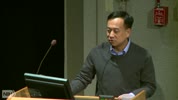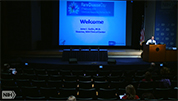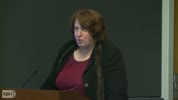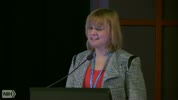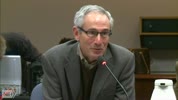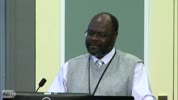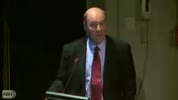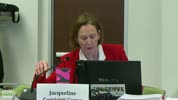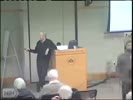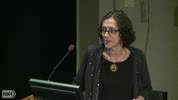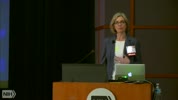-
- NIH VideoCast - Immune Tolerance and Tumor Immunology
-
- - Chen Dong, Tsinghua University (2015/03/31)
- - Category : Immunology
- The Immunology Interest Group
Chen Dong studies the regulation of immune system with a focus on T cell tolerance and helper T cell differentiation. After receiving his Ph.D. from the University of Alabama at Birmingham with Max Cooper and completing a postdoctoral fellowship at Yale University with Richard Flavell, Chen joined the faculty at University of Washington School of Medicine in 2000. In 2004 he moved to the Department of Immunology, University of Texas M.D. Anderson Cancer Center as an Associate Professor, becoming a Professor in 2008. In 2013, Chen moved to Beijing to build and lead the new Institute for Immunology at Tsinghua University. Among his many important contributions to immunology, Chen identified the TH17 cell lineage and elucidated their unique developmental regulation and critical function in inflammatory diseases. He has recently analyzed the differentiation of T follicular helper (Tfh) and regulatory (Tfr) cells and shown essential transcription factors in this process. He has also studied the roles of IL-17 family cytokines in inflammation and cancer and the underlying signaling mechanisms. In addition, he has identified and characterized important cell-surface and intracellular molecules involved in regulation of T cell activation and tolerance and has used genetic approaches to investigate the roles of various molecules in MAP kinase and ubiquitin/ubiquitin-like signaling pathways in the immune system.
For more information go to http://sigs.nih.gov/immunology/Pages/default.aspx
NIH VideoCast - Immune Tolerance and Tumor Immunology
-
- NIH VideoCast - SPARC Strategic Planning Workshop: Biology & Technology (Day 2)
-
- - NIH-OD/DPCPSI/Office of Strategic Coordination (2015/03/31)
- - Category : Advisory Board Meetings
- The SPARC Biology and Technology Workshop bring together disparate research communities to assess the following: ? The current status of functional and anatomical mapping of peripheral innervation in organs. The opportunities for additional knowledge and technologies that would be foundational for understanding neuronal control of organ and organ system function in animal models and humans. Furthermore, this workshop will help elucidate technical and biological opportunities within and across communities in a variety of organs and conditions.
For more information go to http://www.scgcorp.com/sparc2015/Default
NIH VideoCast - SPARC Strategic Planning Workshop: Biology & Technology (Day 2)
-
- NIH VideoCast - NIH BD2K Workshop on Community-Based Data and Metadata Standards (Day 2)
-
- - NIH (2015/03/31)
- - Category : Conferences
- The ability to harvest the wealth of information contained in biomedical Big Data will advance our understanding of human health and disease; however, lack of appropriate tools, poor data accessibility, and insufficient training, are major impediments to rapid translational impact. To meet this challenge, NIH launched the BD2K trans-NIH initiative to enable biomedical research as a digital research enterprise, to facilitate discovery and support new knowledge, and to maximize community engagement. An important aspect of meeting this challenge is to make biomedical research data and resources maximally shareable and reusable. For this reason, BD2K is formulating approaches to encourage development and facilitate the use of data-related (including metadata) standards more broadly across the biomedical research community and is, therefore, interested in the issues involved in developing Community-Based Standards (CBS).
Goals
1.Effective approaches, processes, and activities that could advance the community-based standards landscape (e.g., creating a collaborative workspace or an advising structure toward standards development, extension, or adoption).
2.Gaps in community-based data standards of relevance to biomedical research, including real use-cases (e.g., emerging fields and technologies, or research domains with multiple existing data standards that could benefit from additional work, integration and/or reconciliation).
3.Lessons learned from existing CBS efforts, particularly examples with field-tested processes and infrastructure or known examples of failures by CBS efforts.
4.Common challenges in CBS development (e.g., methods for community engagement or building interoperability with other related standards).
5.Considerations for evaluating progress and milestones to assess data standards development and utility.
6.Effective approaches for addressing the need to sustain useful standards, and to update existing standards as a field develops.
Follow and interact on Twitter #BD2K @NIH_BD2K
For more information go to https://tools.niehs.nih.gov/conference/community-based_standards/index.cfm
NIH VideoCast - NIH BD2K Workshop on Community-Based Data and Metadata Standards (Day 2)
-
- NIH VideoCast - NIH Rare Disease Day 2015
-
- - ORDR, NIH (2015/03/31)
- - Category : Conferences
- A day with speakers and posters to promote awareness and give updates in the world of rare diseases.
For more information go to http://rarediseases.info.nih.gov/news-and-events/pages/28/rare-disease-day
NIH VideoCast - NIH Rare Disease Day 2015
-
- NIH VideoCast - Evo-devo insight into the functional organization of the cerebral cortex
-
- - Barbara Finlay, Ph.D., Cornell University (2015/03/31)
- - Category : Neuroscience
- Neuroscience Seminar Series
Dr. Finlay lab takes an approach to the structure and function of the vertebrate nervous system, particularly the visual system and the cerebral cortex, that is both developmental and evolutionary. What "units" of variation do brain and behavior offer up to natural selection? Is structural change in brains over evolution piecemeal, related to specific adaptive function, or does the brain change as a coordinated unit? They have found that brains change in a highly constrained coordinated fashion as they enlarge, which can be related to a highly conserved sequence of structural development. Late-generated structures become disproportionately large, in an extremely predictable fashion. This strengthens the case for viewing the cerebral cortex as a general-purpose learning device rather than a collection of specially-adapted mechanisms, and they are interested in the window this gives us on the nature of human cognition. But, brains also differ, and present research is beginning the investigation of how the brain variations associated with particular niches, like nocturnal versus diurnal, are produced by changes in neural development.
NIH VideoCast - Evo-devo insight into the functional organization of the cerebral cortex
-
- NIH VideoCast - International Symposium on Malignant Mesothelioma 2015
-
- - The Meso Foundation (2015/03/31)
- - Category : Conferences
- This event personifies the mission of the Mesothelioma Applied Research Foundation (Meso Foundation) which is the nonprofit collaboration of patients and families, physicians, advocates, and researchers dedicated to eradicating the life-ending and vicious effects of mesothelioma. We aim to be the global entity for correct medical information regarding mesothelioma and the ???go to??? place for everyone connected with it.
At this event the entire mesothelioma community comes together to learn of the newest advances in the science and research of mesothelioma and also to discover new treatments and approaches to improve the quality of life of those diagnosed with the disease.
For more information go to http://www.curemeso.org/site/c.duIWJfNQKiL8G/b.8578185/k.F0D0/INTERNATIONAL_SYMPOSIUM_ON_MALIGNANT_MESOTHELIOMA.htm
NIH VideoCast - International Symposium on Malignant Mesothelioma 2015
-
- NIH VideoCast - Lifestyle and Breast Cancer
-
- - Pamela Goodwin, MD, MSc, FRCP, Lunenfeld-Tanenbaum Research Institute, University of Toronto Mount Sinai Hospital, Toronto, Ontario (2015/03/31)
- - Category : Stars in Nutrition
- Stars in Nutrition and Cancer
"Lifestyle and Breast Cancer" lecture by Dr. Pamela Goodwin, Professor of Medicine, University of Toronto.
At the end of this presentation, participants will be able to:
To review evidence linking lifestyle (obesity, diet, exercise) to breast cancer outcomes; and
To discuss potential biologic mechanisms for lifestyle effects on breast cancer.
For more information go to http://prevention.cancer.gov/news-events/events/20150303
NIH VideoCast - Lifestyle and Breast Cancer
-
- NIH VideoCast - Demystifying Medicine 2015 - Malaria: Bioengineering and the Global Epidemic of a Killer
-
- - Sangeeta Bhatia, MD, PhD, MIT and Thomas Wellems, MD, PhD, NIAID, NIH (2015/03/31)
- - Category : Demystifying Medicine
- The 2015 Demystifying Medicine Series, which is jointly sponsored by FAES and NIH, will begin January 6th and includes the presentation of patients, pathology, diagnosis and therapy in the context of major disease problems and current research. Primarily directed toward Ph.D. students, clinicians and program managers, the course is designed to help bridge the gap between advances in biology and their application to major human diseases. Each session includes clinical and basic science components presented by NIH staff and invitees. All students, fellows and staff are welcome, as well.
For more information go to http://demystifyingmedicine.od.nih.gov/
NIH VideoCast - Demystifying Medicine 2015 - Malaria: Bioengineering and the Global Epidemic of a Killer
-
- NIH VideoCast - BRAIN Multi-Council Working Group Meeting - March 2015
-
- - NINDS, NIH (2015/03/31)
- - Category : Advisory Board Meetings
- Brain Research through Advancing Innovative Neurotechnologies (BRAIN) Multi-Council Working Group Meeting on March 4, 2015.
For more information go to http://www.braininitiative.nih.gov/how.htm
NIH VideoCast - BRAIN Multi-Council Working Group Meeting - March 2015
-
- NIH VideoCast - NCI Clinical Trials and Translational Research Advisory Committee (CTAC) - March 2015
-
- - NCI Coordinating Center for Clinical Trials (CCCT) (2015/03/31)
- - Category : Clinical Trials and Translational Research
- The CTAC makes recommendations on the NCI-supported national clinical trials enterprise to build a strong scientific infrastructure by bringing together a broadly developed and engaged coalition of stakeholders involved in the clinical trial process.
For more information go to http://deainfo.nci.nih.gov/advisory/ctac/ctacmeetings.htm
NIH VideoCast - NCI Clinical Trials and Translational Research Advisory Committee (CTAC) - March 2015
-
- NIH VideoCast - CC Grand Rounds: Is Old, Old Blood Sometimes Bad, Bad Blood?
-
- - Harvey G. Klein, MD, Chief, Department of Transfusion Medicine, CC, NIH and Charles Natanson, MD, Senior Investigator, Critical Care Medicine Department, CC, NIH (2015/03/31)
- - Category : Clinical Center Grand Rounds
- CC Grand Rounds
For more information go to http://www.cc.nih.gov/about/news/grcurrent.html
NIH VideoCast - CC Grand Rounds: Is Old, Old Blood Sometimes Bad, Bad Blood?
-
- NIH VideoCast - Molecular Immunology
-
- - Erin J. Adams, Ph.D., University of Chicago (2015/03/31)
- - Category : Immunology
- Immunology Interest Group
Dr. Erin Adams received her PhD from UC Berkeley for studies of MHC class I evolution in great apes. Her interest in MHC molecules led her to structural and biophysical studies of 慣棺 and 款灌 T cell receptors and their ligands with Chris Garcia at Stanford. There she developed further her interest in non-classical MHC recognition with the determination of the X-ray structure of a 款灌 TCR in complex with its non-classical T22 ligand, and also determined the structure of the mouse cytomegalovirus immunoevasin m157 that binds NK receptors. In developing her own program at the University of Chicago, she has focused largely on the structural basis of presentation of glycolipid antigens by CD1d and their recognition by NKT TCR. In the past few years she has explored mycobacterial lipid antigen presentation by CD1c, structural features of the TIM4 regulatory receptor, the contribution of butyrophilin-3 family molecules on regulation of 款灌 課 cells, and structural features of MAIT (mucosal associated invariant T) cell TCR recognition of MR-1. Her work draws together a functional and evolutionary perspective on immune recognition with the precision and detail gained from biophysical and structural studies.
For more information go to http://sigs.nih.gov/immunology/Pages/default.aspx
NIH VideoCast - Molecular Immunology
-
- NIH VideoCast - Burkitt lymphoma: a model of polymicrobial carcinogenesis and global oncology
-
- - Sam M. Mbulaiteye, MBChB, MPhil, MMed., Senior Investigator, NCI DCEG, NIH (2015/03/31)
- - Category : NIH Director`s Seminars
- NIH Director`s Seminar
It has been just over 50 years since the description of Burkitt Lymphoma (BL) as an unusual tumor affecting jaws of African children. Seminal discoveries linked to BL includ Epstein-Barr virus, the first human virus linked to a human cancer, the linkage of BL to Plasmodium falciparum malaria, chromosomal translocations involving c-myc and immunoglobulin promoter elements, and demonstration of rapid and curative response to chemotherapy. Dubbed the Rosetta stone of cancer, BL became a complex model for carcinogenesis involving poly-microbes, immunity and host-genetics.
Fifty years later, many fundamental questions remain unanswered. Why BL occurs in a small fraction of people chronically exposed to malaria and/or EBV, the risk conveyed by infections singly or jointly, the specific malaria or EBV proteins involved, and whether EBV or malaria have high-risk variants for BL and the pathogen-host interactions involved in BL. In addition, we do not know how to prevent or adequately treat BL. The lecture will dissect the epidemiology of BL, particularly in Africa. It will explore the inherent difficulties quantifying the association of malaria, EBV, and other exposures in human populations in an effort to summarize the strength and weaknesses of the evidence linking EBV and malaria to BL. Borrowing from malaria diagnostic and vaccine studies, the lecture will explore new approaches to quantify risks of association with specific pathogen proteins and insights into pathways potentially exploited to increase or decrease the risk of BL. It will also highlight the potential of proteomics and genomics technologies to slingshot discoveries in BL. Finally, the lecture will offer a panoramic view of BL as a complex model for carcinogenesis and highlight the critical nature of multidisciplinary and international collaboration to engage and build capacity for pediatric oncology research in developing countries where BL is endemic.
NIH VideoCast - Burkitt lymphoma: a model of polymicrobial carcinogenesis and global oncology
-
- NIH VideoCast - Tranceformation: Hypnosis in Brain and Body
-
- - David Spiegel, M.D., Stanford University School of Medicine (2015/03/31)
- - Category : National Center for Complementary and Integrative Health
- The National Center for Complementary and Integrative Health (NCCIH; formerly NCCAM) presents the Integrative Medicine Research Lecture Series. The series provides overviews of the current state of research and practice involving complementary health approaches and explores perspectives on the emerging discipline of integrative medicine. David Spiegel, M.D., is Willson Professor and Associate Chair of Psychiatry & Behavioral Sciences, Director of the Center on Stress and Health, and Medical Director of the Center for Integrative Medicine at Stanford University School of Medicine, where he has been a member of the academic faculty since 1975. Dr. Spiegel will discuss the nature of hypnosis, its effects on brain function, and how hypnosis can be utilized in the treatment of patients with comorbid psychiatric and medical problems.
For more information go to https://nccih.nih.gov/news/events/IMlectures
NIH VideoCast - Tranceformation: Hypnosis in Brain and Body
-
- NIH VideoCast - Neurobiological mechanisms of emotion processing and regulation in preschool onset depression
-
- - Deana Barch, Ph.D., Washington University, St. Louis (2015/03/31)
- - Category : Neuroscience
- Neuroscience Seminar Series
Dr. Barch???s laboratory studies how humans exert control over their thoughts and behavior, and how this control can break down. Cognitive control is a central aspect of many higher-level functions, such as attention and working memory. Further, the loss of cognitive control is a major component of many neuropsychiatric diseases, such as schizophrenia. The ultimate goal of their research is to contribute to an understanding of how cognitive control emerges in the brain, in terms of the interactions between neural processing elements, and without recourse to "homunculus"-type explanations. Further, they wish to understand the role that loss of cognitive control plays in neuropsychiatric disorders, and what underlying pathophysiology gives rise to such control deficits. To achieve these goals, they use computational modeling and convergent cognitive neuroscience methods.
NIH VideoCast - Neurobiological mechanisms of emotion processing and regulation in preschool onset depression
-
- NIH VideoCast - Recombinant DNA Advisory Committee - March 2015
-
- - Office of the Director, NIH (2015/03/31)
- - Category : Recombinant DNA Advisory Committee
- Recombinant DNA Advisory Committee
NIH VideoCast - Recombinant DNA Advisory Committee - March 2015
-
- NIH VideoCast - Demystifying Medicine 2015 - Mitochondria: Biology Meets Disease
-
- - Richard Youle, PhD, NINDS, NIH and Michael Sack, MD, PhD, NHLBI, NIH (2015/03/31)
- - Category : Demystifying Medicine
- The 2015 Demystifying Medicine Series, which is jointly sponsored by FAES and NIH, will begin January 6th and includes the presentation of patients, pathology, diagnosis and therapy in the context of major disease problems and current research. Primarily directed toward Ph.D. students, clinicians and program managers, the course is designed to help bridge the gap between advances in biology and their application to major human diseases. Each session includes clinical and basic science components presented by NIH staff and invitees. All students, fellows and staff are welcome, as well.
For more information go to http://demystifyingmedicine.od.nih.gov/
NIH VideoCast - Demystifying Medicine 2015 - Mitochondria: Biology Meets Disease
-
- NIH VideoCast - NCI Board of Scientific Advisors Meeting - March 2015
-
- - NCI, NIH (2015/03/31)
- - Category : NCI Board of Scientific Advisors
- The 56th meeting of the NCI Board of Scientific Advisors
NIH VideoCast - NCI Board of Scientific Advisors Meeting - March 2015
-
- NIH VideoCast - CC Grand Rounds: Contemporary Clinical Medicine: Great Teachers: From Physician to Patient to Poet
-
- - Laura Liberman, MD, Director, Office of Faculty Development, Attending Radiologist, Breast Imaging Service, Memorial Sloan Kettering Cancer Center (2015/03/31)
- - Category : Clinical Center Grand Rounds
- CC Grand Rounds: Contemporary Clinical Medicine: Great Teachers
For more information go to http://www.cc.nih.gov/about/news/grcurrent.html
NIH VideoCast - CC Grand Rounds: Contemporary Clinical Medicine: Great Teachers: From Physician to Patient to Poet
-
- NIH VideoCast - CRISPR-Cas genome surveillance: From basic biology to transformative technology
-
- - Jennifer Doudna, Ph.D., Li Ka Shing Chancellor`s Chair in Biomedical Sciences and Professor, Department of Molecular and Cell Biology and Department of Chemistry at the University of California, Berkeley; Investigator, Howard Hughes Medical Institute (2015/03/31)
- - Category : WALS - Wednesday Afternoon Lectures
- Wednesday Afternoon Lecture Series
Margaret Pittman Lecture
Dr. Doudna, who specializes in the study of RNA, will present a brief history of the bacterial RNA-guided CRISPR biology from its initial discovery through the elucidation of the CRISPR-Cas9 enzyme mechanism. Using CRISPR-Cas (clustered regularly interspaced short palindromic repeats) technology provides the foundation for remarkable developments in modifying, regulating, or marking genomic loci in a wide variety of cells and organisms. These results highlight a new era in which genomic manipulation is no longer a bottleneck to experiments, paving the way to fundamental discoveries in biology with applications in all branches of biotechnology, and strategies for human therapeutics. Dr. Doudna will discuss recent findings regarding the molecular mechanism of Cas9 and its use for targeted cell-based therapies.
About the annual Margaret Pittman Lecture:
This annual lecture honors Dr. Margaret Pittman, NIH???s first female lab chief, who made significant contributions to microbiology and vaccine development, particularly in the areas of pertussis and tetanus, during her long career at the National Institute of Allergy and Infectious Diseases.
For more information go to http://wals.od.nih.gov
NIH VideoCast - CRISPR-Cas genome surveillance: From basic biology to transformative technology



